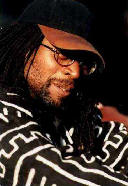 Brian
Jackson Brian
Jackson
|
|||
|
Brian Jackson was born and raised in the Crown Heights section of
Brooklyn where he began piano lessons at age seven. Drums and trumpet
were too loud for the apartment but that didn’t stop Brian from
requesting his favorite album over and over, by "Brownie" -
Clifford Brown - as he sat in front of the record player.
More helpings of trumpeters like Miles Davis and Lee Morgan, pianists Ahmad Jamal, Wynton Kelly and Les McCann and vocalists like Sarah Vaughn and Gloria Lynne helped feed his voracious musical appetite. Told he had to study classical music before he could learn jazz, Brian pushed ahead determinedly toward his goal. "There are a lot of European composers whose work I really respect. I grew up on jazz and European music", Brian acknowledges. "But I have a problem with the term ‘classical’ to describe only their contributions. To me ‘classical’ music is anything that has stood the test of time. In this country, many African-American composers like Fletcher Henderson and Duke Ellington are not considered classical composers. Everywhere else in the world they are, so what’s wrong with this picture?" Brian began collaborating with Gil Scott-Heron in the late ‘60’s. Together they recorded such memorable compositions as The Bottle (with Brian on flute), Johannesburg, Pieces of a Man and I Think I’ll Call It Morning. Because of this diverse musical tastes, Brian has collaborated with artists from Kool and the Gang to George Benson to Janis Seigel of Manhattan Transfer to Will Downing, whose self-titled first album, produced by Will and Brian, went gold in the United Kingdom in eight weeks. Content with being behind the scenes in the past, Brian has finally decided to step out front. He reasons: "During my entire career people have always come up to me and said, ‘You know, I have to listen to this one song you wrote every morning before I go to work or else I don’t feel as if my day has started right.’ And I can relate to that because I have songs I feel that way about too. They help you get through it. If I can help someone, I feel I’ve done my job. And if they come out to see us and give back what they’re getting, we’ll have a serious energy loop going. That’s what I’m here for, to hold that loop together."
|